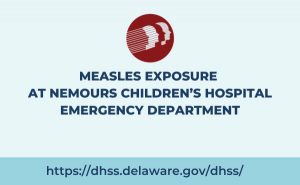Governor Markell Declares Radiation Protection Week at Delaware Tech Students’ Open House
s 17 second-year Radiologic Technology students looked on, Governor Jack Markell signed a proclamation designating Nov. 6-12, 2016 as Radiation Protection Week. The signing occurred at Delaware Technical Community College’s (DTCC) Jack F. Owens Campus in Georgetown. The occasion preceded an annual student-run Radiologic Technology Open House where students demonstrated their knowledge of medical x-ray imaging equipment and procedures at seven stations. The event also celebrated a trio of anniversaries: the 50th anniversary of the college, the 40th anniversary of the Authority on Radiation Protection, and the 30th anniversary of the Radiologic Technology Program at the Owens Campus.
DPH Announces First Confirmed Flu Case of 2016-2017 Season at Drive-Thru Flu Clinic Vaccination Event
Today, Delaware’s Division of Public Health (DPH) announced the state’s first laboratory-confirmed case of influenza for the 2016-2017 flu season. The case involves a 27-year-old Kent County man who was not hospitalized. DPH made the announcement during the press event portion of a drive-thru flu clinic held in Dover, which served as the official kickoff of its 2016-2017 flu season prevention efforts. The free drive-thru flu clinic was conducted outside of the Blue Hen Corporate Center in Dover. It was the first DPH drive-thru flu clinic in Kent County, and is expected to be the largest. DPH nursing staff, joined by Bayhealth nurses, administered intramuscular flu vaccines. Local radio station Eagle 97.7 provided entertainment.
Public Health Celebrates the Office of Animal Welfare and Outgoing Director Hetti Brown
Three years after it was created, the Division of Public Health (DPH) Office of Animal Welfare (OAW) celebrates today the accomplishments of OAW, including those of Director Hetti Brown. Brown, who will be leaving Dec. 2, 2016 to move to the Midwest, expressed her appreciation to the OAW team and its many supporters. “It has been a privilege to work with such a great group of people,” said Director Brown. “I have also been lucky to work with so many legislators and animal advocates over the years as we created this office. Moving was a difficult decision and I will miss Delaware. I am confident that OAW will remain strong and that DPH will select an accomplished successor.”
Delaware First Responders and Hospitals Recognized for 20 Years of Saving Lives
When someone is seriously injured, seconds or moments can make the difference between life and death. To increase the chance of survival and reduce the chance of permanent disability, Delaware created an integrated, statewide trauma system 20 years ago that begins with a 9-1-1 call and does not end until after the patient receives high quality hospital care. The Delaware Trauma System members include 9-1-1 Emergency Communications Centers, Emergency Medical Service (EMS) providers of Basic and Advanced Life Support, fire and police agencies, air medical transport, hospital emergency trauma teams, operating rooms, and intensive care units. The system includes the helicopters you might see in the sky, the ambulance you might see on the road, and the emergency room medical personnel and surgeons that could save someone close to you. To celebrate the men and women of the trauma system, dozens of medical professionals, and first responders filled the House of Representatives chambers at Legislative Hall on Tuesday, joined by state and local officials to mark the 20th anniversary of the Delaware Trauma System.
Getting Your Flu Shot is Easier Than Ever Before: Attorney General Matt Denn Joins DPH at NcCo Flu Clinic to Encourage Vaccinations
Delaware Attorney General Matt Denn joined Division of Public Health (DPH) officials to encourage all residents to get their flu shot at a free flu clinic held today in Wilmington. The clinic, held at the Porter State Service Center, was the first one in New Castle County for the 2016-2017 flu season. A full listing of upcoming DPH flu clinics in each county can be found at flu.delaware.gov. This includes DPH’s first drive-thru flu clinic in several years, scheduled for October 27, 2016, from 10:00 a.m. to 4:00 p.m. in the parking lot of the Blue Hen Corporate Center. The Porter Service Center flu clinic provided a festive atmosphere with a live DJ spinning music and staff handing out free gift cards to the first 150 people to receive their flu shots. Attorney General Denn was one of 218 individuals to receive a flu shot at the event.













































































